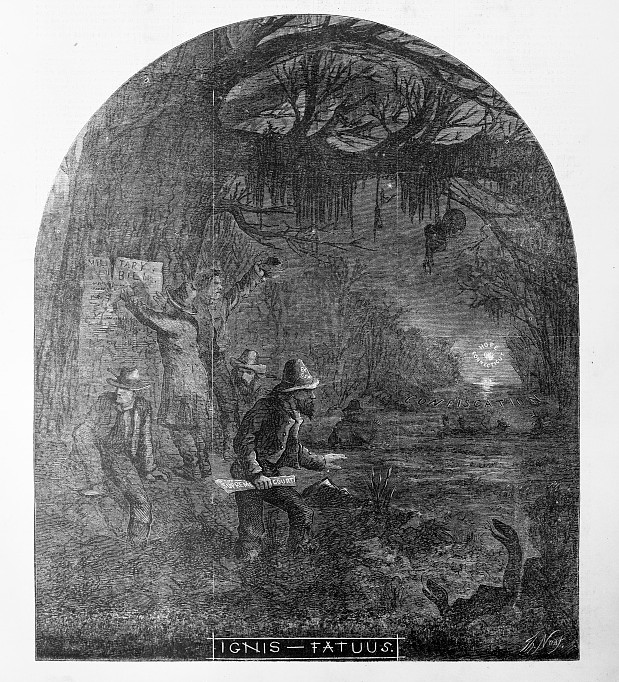Will O’ The Wisp
By Laura E. Richards
Annotations by Josh Benjamin

“WILL O’ THE WISP, Will o’ the wisp, Show me your lantern true! Over the meadow and over the hill, Gladly I’ll follow you. “Never I’ll murmer, nor ask for rest, And ever I’ll be your friend, If you’ll only give me the pot of gold That lies at your journey’s end.” And after the light went the brave little boy, Trudging along so bold; And thinking of all the fine things he'd buy With the wonderful pot of gold: “A house, and a horse, and a full-rigged ship, And a ton of peppermint drops, And all the marbles there are in the world, And all the new kinds of tops.” Will o’ the wisp, Will o’ the wisp, Flew down at last in a swamp. He put out his lantern and vanished away In the evening chill and damp. And the poor little boy went shivering home, Wet and tired and cold. He had come, alas! to his journey’s end, But where was the pot of gold?

Richards, Laura E. “Will O’ the wisp.” St. nicholas; an illustrated magazine for young folks 8, No. 2 (December 1880): 117.
Contexts
Merriam Webster’s entry on the will o’ the wisp offers a brief summary of the origins of the phenomenon:
The will-o’-the-wisp is a flame-like phosphorescence caused by gases from decaying plants in marshy areas. In olden days, it was personified as “Will with the wisp,” a sprite who carried a fleeting “wisp” of light. Foolish travelers were said to try to follow the light and were then led astray into the marsh. (An 18th-century fairy tale described Will as one “who bears the wispy fire to trail the swains among the mire.”) The light was first known, and still also is, as ignis fatuus, which in Latin means “foolish fire.” Eventually, the name will-o’-the-wisp was extended to any impractical or unattainable goal. (“Will-o’-the-wisp.” Merriam-Webster.com Dictionary, Merriam-Webster.)
This story is an interesting mix of superstition and natural history. The will o’ the wisp, like many other naturally-occurring phenomena, was beyond human understanding for much of its history. The lack of understanding often leads to inventive tales to explain what we can’t explain.
Resources for Further Study
- This video presents several hypotheses for the phenomenon, including a modern understanding of Allesandro Volta’s explanation of swamp gases being the cause.
- A scientific explanation of phosphine gas from marshes as the cause for the strange glows described as the will-o’-the-wisp.
- Speculation on the historical context of the will-o’-the-wisp as an extremophile organism — something that can exist in harsh environments.
- Hans Christian Andersen’s story about the phenomenon: The Will-O’-the-Wisps Are in Town.